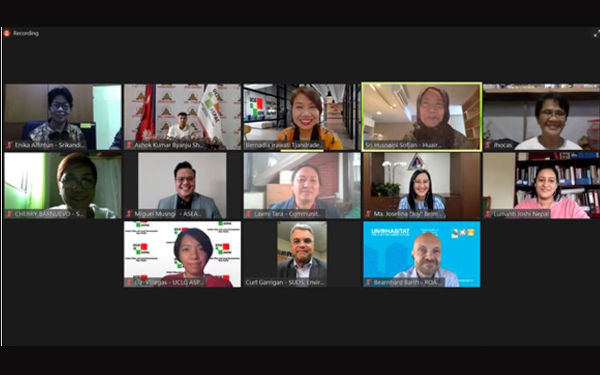The road to completing the Global 2030 agenda of achieving Sustainable Development Goals or SDGs has been met with challenges brought on by the COVID-19 pandemic. This is true globally, as well as in the Asia-Pacific region. To look at where the region is in terms of reaching this agenda, UN ESCAP held the 8th Asia-Pacific Forum for Sustainable Development (APFSD) event all through last week on 22nd to 26th March 2021 at hybrid mode in Bangkok, Thailand with the theme “Sustainable and resilient recovery from the COVID-19 pandemic in Asia and the Pacific.”
It is an annual and inclusive intergovernmental forum as a regional platform for countries in the Asia-Pacific which addressed issues and challenges in the efforts of achieving SDGs. This forum facilitates discussion and sharing on regional trends, best practices and lessons learned, in which provides a regional perspective on the implementation of the 2030 Agenda. The forum also takes into consideration the contributions of the United Nations system bodies at the regional level, other regional and sub regional organizations, and relevant stakeholders, in implementing the 2030 Agenda. At the end of discussions, the APFSD supports the follow-up review and monitoring on progress of the 2030 Agenda at the regional level.
In addition to the main event, the 8th APFSD also conducted side events which aims providing an opportunity to discuss the theme of the 2021 APFSD “Sustainable and resilient recovery from the COVID-19 pandemic in Asia and the Pacific”, or one (or more) of the SDGs under review, or to deepen discussions on Voluntary National Reviews, and to share good practices, identify new and emerging issues, and spread greater awareness of the 2030 Agenda and the SDGs.
One of those side events promotes gender-responsive, inclusive, and participatory mechanisms that ensure recognition roles of organised grassroots groups and local government as policy, plans and programmes are being developed for Covid-19 recovery. It was held on the 22nd of March 2021, with the theme “Our Vision of a Sustainable and Resilient Recovery from the COVID-19 Pandemic: Grassroots Women and Local Government Leaders Speak Out”.
In this forum grassroots Women and Local Government Leaders shared their visions absed on reality and what is really needed on the ground. Ms. Enika Alfintun from Srikandi Women’s Group, and Chief of Neighbourhood Association, Terban sub-district, Yogyakarta, Indonesia, amplified that during and even post-pandemic, food resiliency must always be prioritised, particularly for families as the main target. “Women farmers actually have a significant role in proving food resilience for families, and one of the approaches includes socialising and changing unproductive land into productive land that can sustain food for families. That way, we can help in improving the availability, affordability of family food,” she said. Further, to ensure that no one is left behind, Ms. Enika emphasized how beneficial it is to partner with local governments, for example, through improvements in the quality collection of data of households in Yogyakarta. “Mapping is so important so we can reach out to more families,” she added.
Ms. Josefina Belmonte as Mayor of Quezon City, Philippines also addressed on the topic of food resiliency which is included in the city’s initiative to support women during the pandemic. “We have advocated urban farming for the past 10 years. Now we have 116 community farms that provide nutritious food and livelihood for women farmers and their families, and harvest from the two biggest farms are purchased by the city, which is then turned into assistance from vulnerable groups which include women and children,” She also shared that Quezon City has also been providing help in handling cases of domestic violence in the city. “Women can report through our protection centre, our online complaints desk, community focal persons or our hotline 112. There women can find shelter, get help in counselling, legal advice to recover and be re-integrated into society. We strive to achieve sustainable development through the eyes of women.”
Mayor Ashok Kumar Byanju Shresta, the President of UCLG ASPAC highlighted that attainment of SDGs through the empowerment of women will ultimately contribute to COVID-19 mitigation and recovery efforts, as addressed through ULCG ASPAC 2021-2025 Manifesto. “Women’s empowerment and gender mainstreaming should be implemented, and we encourage participation of women in local government for better sustainable development.”
Mr. Curt Garrigan, Chief of the Sustainable Urban development Section, Environment and Development Division of UNESCAP notified that there is a lot to be done in terms of achieving SDGs in the Asia Pacific, including SDGs 5 on Gender Equality due to the lack of data. “Out of 9 SDGs targets, there are only 2 with sufficient data available to show progress in achieving gender equality. The biggest challenge is about closing gender-wage gap, therefore we need more women in leadership positions to push this goal forward.”
As a wrap up and closing remarks, Dr. Bernadia Irawati Tjandradewi as Secretary General of UCLG ASPAC placed utmost urgency in making sure that mutual and inclusive partnership, as well as inserting a gender perspective in planning must be prioritised through concrete actions. “We still see inequalities everywhere, lots of marginal groups, and women migrants have been struggling as well. The work is just beginning, what’s important is to have integrated gender perspective, gender lens in planning but more important is to have action.”
Prepared by KM Team
To see further information on the Asia Pacific Forum on Sustainable Development 2021 please visit:
Asia-Pacific Forum on Sustainable Development 2021 | ESCAP
https://www.unescap.org › apfsd › 8











